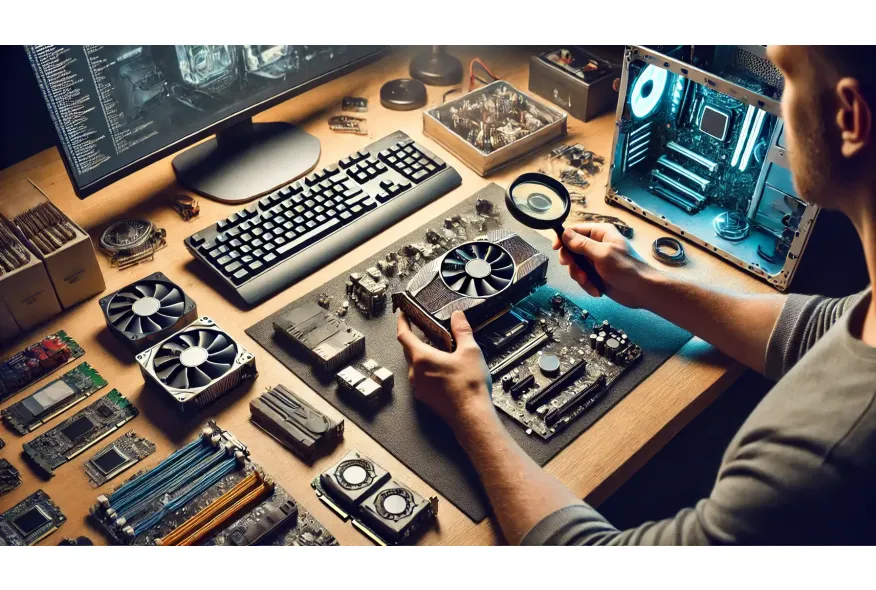What to Look for Before Buying Second-Hand PC Parts?
Buying used PC parts can be a great way to save money, but it also comes with risks. If you're not careful, you could end up with faulty components, counterfeit products, or items with a very short lifespan. This guide will help you understand what to check before purchasing second-hand PC components to ensure you get the best value for your money.
1. Why Buy Second-Hand PC Parts?
Purchasing used components can offer significant advantages:
✅ Lower Prices: Save money compared to buying new hardware.
✅ Great for Budget Builds: Perfect for assembling a high-performance PC at a lower cost.
✅ Access to Older Parts: Find discontinued components for upgrades or repairs.
However, there are risks:
⚠️ No Warranty: Used parts often come without a manufacturer’s warranty.
⚠️ Unknown History: You may not know how the previous owner used or maintained the component.
⚠️ Risk of Defects: Some parts may have hidden issues that only appear after purchase.
To minimize risks, follow the guidelines below.
2. Essential Things to Check Before Buying Used PC Parts
2.1. General Inspection for Any PC Component
No matter what hardware you're buying, always check the following:
🔹 Physical Condition: Look for damage, rust, or burnt areas.
🔹 Brand and Model: Verify that the part matches the seller’s description.
🔹 Test Before Buying: If possible, test the component in person before purchasing.
🔹 Return Policy: Prefer sellers who offer a return option in case of defects.
3. How to Inspect Specific PC Components
3.1. Buying a Used CPU (Processor)
What to Check:
✅ Socket Compatibility: Ensure it matches your motherboard.
✅ Bent Pins: Intel CPUs have contacts on the motherboard, while AMD CPUs have pins—make sure they’re straight.
✅ Overclocking History: Avoid CPUs that were heavily overclocked, as they may have reduced lifespan.
🔹 Best Practices: Ask for proof that the CPU was tested in a working system before buying.
3.2. Buying a Used GPU (Graphics Card)
What to Check:
✅ Physical Inspection: Look for dust buildup, bent connectors, or missing capacitors.
✅ Performance Testing: Run a benchmarking test like FurMark or 3DMark before purchasing.
✅ Mining History: Avoid GPUs used for cryptocurrency mining, as they often suffer from excessive wear.
🔹 Best Practices: Ask for benchmark screenshots and ensure the cooling fans function properly.
3.3. Buying a Used Motherboard
What to Check:
✅ No Bent Pins in the CPU Socket: Check for misaligned or missing pins.
✅ Working RAM Slots: Test all slots to confirm they function correctly.
✅ No Corrosion or Burn Marks: Inspect for any damage near capacitors and power connectors.
🔹 Best Practices: Buy from trusted sellers who provide a BIOS update history and power-on proof.
3.4. Buying Used RAM (Memory)
What to Check:
✅ Compatible with Your Motherboard: Check DDR3, DDR4, or DDR5 compatibility.
✅ No Physical Damage: Ensure no chips are missing or burned.
✅ Memory Tests: Run MemTest86 to check for faulty RAM.
🔹 Best Practices: Prefer buying RAM in matching pairs for better performance.
3.5. Buying a Used SSD or HDD (Storage Drive)
What to Check:
✅ Health Status: Use CrystalDiskInfo to check drive health.
✅ Usage Hours: Drives with excessive read/write cycles may fail soon.
✅ No Strange Noises (HDDs): Clicking or grinding sounds indicate failure.
🔹 Best Practices: Avoid HDDs older than 5 years and prefer SSDs with at least 80% life remaining.
3.6. Buying a Used Power Supply (PSU) – Should You?
🚨 Warning: Buying a second-hand PSU is risky! A failing PSU can damage other components.
If you must buy used, check:
✅ Brand & Model: Stick to reputable brands like Corsair, EVGA, Seasonic, or Thermaltake.
✅ 80 PLUS Certification: Ensures energy efficiency.
✅ No Strange Noises: Any buzzing or whining is a red flag.
🔹 Best Practices: If possible, buy a new PSU instead of used to avoid system failures.
4. Where to Buy Used PC Parts Safely?
Best Online Marketplaces
🛒 eBay – Offers buyer protection.
🛒 Reddit’s r/hardwareswap – Trusted community for used PC parts.
🛒 Facebook Marketplace – Local deals, but check components in person.
Best Local Options
🏪 Computer Repair Shops – Some offer tested and warrantied used parts.
🏪 Tech Meetups & Swap Events – Great places to find deals from enthusiasts.
🚨 Avoid Buying From:
❌ Unverified sellers with no history
❌ "Too good to be true" deals
❌ Auction sites with no buyer protection

5. Final Tips for Buying Used PC Parts
✅ Always ask for proof of working condition (screenshots or videos).
✅ Meet in person when possible and test before buying.
✅ Avoid overclocked or heavily used mining GPUs.
✅ Use secure payment methods when buying online.
✅ Consider a warranty or return policy whenever available.
If done carefully, buying second-hand PC parts can save you a lot of money while still providing excellent performance. Just make sure you inspect everything thoroughly to avoid future headaches! 🚀







